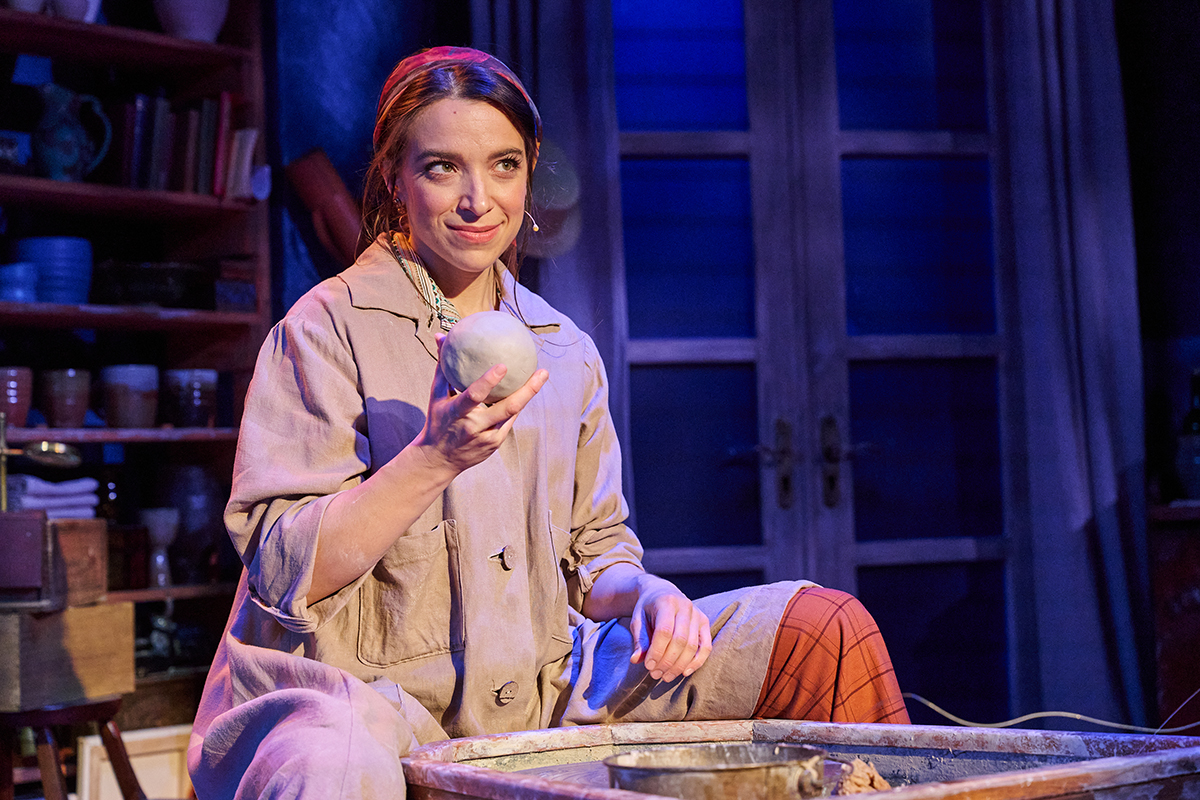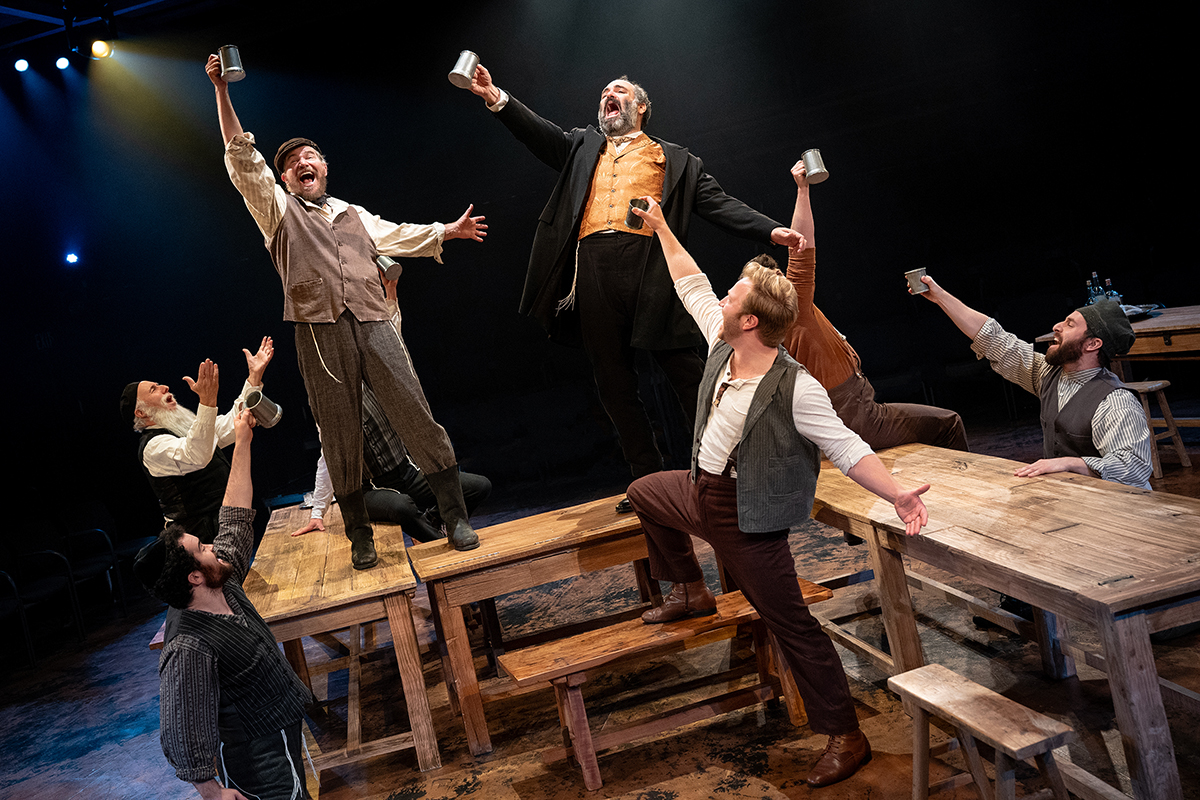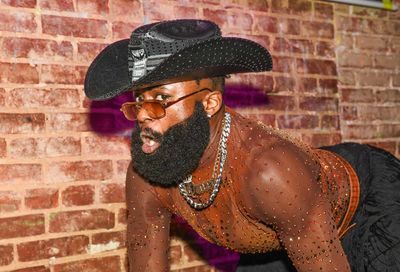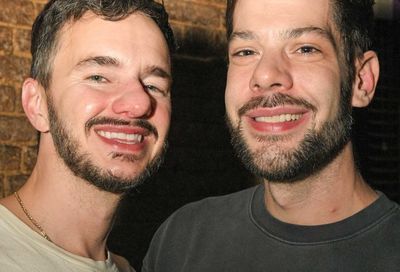Tell-Tale Start
Matt Conner's poetical inspiration behind his Edgar Allen Poe musical, 'Nevermore'
Matt Conner cannot read music.
But that hasn’t stopped him from playing the piano for nearly three decades. He particularly likes to play in the dark.
 |
”When you play the piano in the dark, there is a sense of the macabre,” he says. ”There’s also a sense of freedom. In the dark, there’s no exposure, no external eyes judging. I felt freer in the dark.”
No wonder he felt a certain kinship upon reading the works of Edgar Allan Poe, the 19th Century troubled literary legend whose poems and stories continue to influence and unsettle audiences today. Privately, Conner began composing music to accompany Poe’s work. Years later, a defective lamp and water-damaged wall provided a stroke of luck in the form of fire.
That fire, two years ago, destroyed the home he shared with his partner, fellow actor Stephen Gregory Smith. Signature Theatre’s artistic director, Eric Schaeffer, who already knew Smith well, offered the couple temporary refuge. Conner passed some of the time on Schaeffer’s piano.
”It was original, new, different. It was something you’ve never heard before,” Schaeffer remembers. ”I don’t think he realized what he’d written was as good as it was. My brain was spinning about what to do with this and how to do it.”
When the spinning settled, Schaeffer commissioned Conner to compose a musical based on Poe’s work for Signature. The risk paid off. Signature has already commissioned Conner to compose a second piece, based on the Underground Railroad.
Till then, however, audiences must content themselves with Nevermore. Not much to ask considering the 90-minute musical has been given a first-class treatment at Signature, including direction by Schaeffer and sumptuous orchestrations by the legendary Jonathan Tunick. Rather than a narrative moving from Point A to Point B, Nevermore presents Poe through his own words — and the women in his life — conjuring an unconventional emotional portrait. Sexually graphic at times, this is definitely not your 9th-grade Poe.
By the light of day, Conner still looks dressed for the dark. Somewhere, there is a goth gay boy conjuring up just this image of Conner as his dream date, right down to the Poe T-shirt he sports, a gift from Smith. But while he looks the part, ready to gloom a room with a stern look, he’s mostly smiles and laughter about theater and martinis. His counterpart thespians at Signature don’t seem entirely ready to accept Conner as master composer, mocking him tenderly as he poses for a cover photo shoot in Signature Theatre’s lobby. True to his acting roots, Conner just seems happy for the attention.
METRO WEEKLY: Is there a cult of Poe? Are you getting any weird fan mail?
MATT CONNER: Not yet. But I have a feeling toward the end of the run, there will be a big, gothic following.
MW: Are you prepared for that?
CONNER: Yeah, yeah. I’m not a Poe historian, so that’s kind of tricky. I did my research and learned about Poe, but if someone were to question me about Poe, I’d have to think a little bit.
MW: You’re not expecting dead ravens on your front porch?
CONNER: No. [Laughs] Could you imagine?
MW: Let’s go back to the beginning. Let’s start with your birth.
CONNER: My birthday is Jan. 10, 1970, which makes me a grand total of 36. I was born in Winchester, Va. I grew up in Stephens City, two exits away. It’s a very conservative, country town — lots of church-going people, lots of farms. Lots of honest, ”Mayberry” types. My parents are very ”Mayberryish.”
MW: And you grew up on a dairy farm. Can you milk a cow?
CONNER: I can.
MW: Some might look at your farmland childhood as charming. Others might see it as muddy and provincial. Would you not trade it for the world, or do you wish you’d grown up in Manhattan?
CONNER: I think growing up on the farm was where I first found my sense for entertainment. We didn’t have anything to do, except farm.
I have three brothers, and we were always clowns. There were always dinners, church things, functions where we had nothing to do but make stuff up. We even had an imaginary band called Crazy Horses. We were out in the fields working on hay and stuff, and we thought that we were some rock band. But we clearly weren’t.
MW: Maybe not a rock band, but you did take piano, right?
CONNER: All my brothers had an interest in music. I took piano for eight months, then quit. I was 8-years-old. I didn’t like the discipline. I was that kid in school who couldn’t concentrate on the math homework because I was creating stuff in my head, delving into that imaginary world.
MW: Did you create imaginary friends?
CONNER: No. I didn’t have to. Growing up on the farm, there was a huge church community. Our doors were never locked. In the middle of the night, in the early morning, there were always family and friends. Like a neighbor driving a tractor down the road stopping in for a cup of coffee. We were always surrounded by a lot of people.
MW: And now you have family here. Tell me about your partner.
CONNER: His name is Stephen Gregory Smith. He’s an actor as well. We went to college together at Shenandoah University in Winchester. We’ve done lots of shows together. He’s very supportive. But we’re two entirely different artists. He’s all-American, Irish, sort of reddish hair — the leading-man character. I lean toward an edgy, rock-and-roll feel. I was Judas in Jesus Christ Superstar. I was Spider in Jekyll & Hyde. I played several female parts in Pacific Overtures here at Signature. I’m drawn to the darker, edgier stuff. Writing a Poe show, I definitely lean toward the darker side.
MW: What’s it like for you to play women’s roles?
CONNER: Being gay, I have a feminine side I can tap into. As an actor, it’s just being free to express anything. Being comfortable with myself as a human being in real life helps me to be really comfortable to create whatever I want onstage.
I did Naked Boys Singing! at Source Theatre with Actors Theatre of Washington. Of course, I had to be naked for the whole show. If I can go out and do a show absolutely butt naked and have everyone — especially in the gay community — judge every inch of my body, it really makes you grow a lot as an actor.
MW: Speaking of exposure, what was your coming out like?
CONNER: I came out to my mother when I was 23. I came out to my brothers. I’ve never come out to my father. I don’t know what he knows. He loves me and Stephen, but I’m not sure what else he thinks. I can’t go there with my father. They’re very right-wing people. I couldn’t even begin to have that conversation with my dad.
I’d been dating women quite a bit, growing up. I was taking after my father, who was a sort of dashing man, who always had many dates. My dad didn’t get married till he was 32. At the time, that was kind of scandalous. Everybody thought I was going to be like my daddy. ”Aw, he’s just runnin’ around. He’s just waitin’. He’s gonna play the field.”
MW: Your church upbringing seems to have influenced your life in many ways, both good and bad, whether it’s your musical background or your family’s politics. Which denomination are we talking about?
CONNER: Church of the Brethren. It’s an old, Germanic church, similar to Mennonite or Quaker. It’s very conservative.
Before I was born, there were buggies. The church has posts where you’d hook up your horse and buggy. Women would sit on one side of the church and the men sat on the other. They would enter through separate doors, and the women basically did not speak. After I was born, there was still the residual of that idea. Women were encouraged — but not told — not to wear makeup. They were sort of encouraged not to cut their hair.
In a weird sense, being a big homo, I’ve never really left that grounding that I had with my parents and the church. They only way to explain my talent is to say it’s God-given, so I continue that thought process through everything that’s happened. I just look at it like it’s a huge, huge blessing.
MW: Is there a religious component in your life today?
CONNER: I would say spiritual component. I still have huge convictions. I really don’t think I’d be here today without that spiritual growth. What I’ve left is the conventional church and the world of organized religion. I would identify myself as a Christian.
MW: And you got your theatrical start in the church?
CONNER: I played the piano, but it was all by ear. I just made stuff up. I played for offerings, for hymn sings, a gathering of choirs from different churches all coming together for an evening.
Then I became the director of the junior choir. Then the director of the senior choir. Then I began writing my own passion plays. And I did the Easter and Christmas pageants.
 |
MW: That’s when your interest in theater took hold?
CONNER: Sure. I didn’t know theater at all. My parents didn’t have the money to even begin to buy a ticket. But there was a community thing that happened every year: The Hospital Follies. It was a variety show to raise money for the hospital. I was asked to be in it as an actor-slash-singer-slash-dancer. It was there that I started meeting other gay people. It was there where I met other open-minded people.
MW: Had you started college yet?
CONNER: No. I started Shenandoah University a little bit late, at 23. No one in my family goes to college. No one talks about it. I didn’t think about it because I hadn’t had that exposure. It wasn’t until I went to Lord Fairfax Community College and joined a gospel group that I really decided that I was going to go to school for theater. Specifically, musical theater, because the through-line of everything was music. It was the passion of the music that drove everything, from church to college to the Hospital Follies.
MW: Did you have to audition for admission?
CONNER: I did audition. I did something from The Glass Menagerie, and I sang something from Mame. And I had no idea what I was doing. After my audition, the director looked at me — he pulled he glasses down — and said, ”You do realize this is a very serious program, right?”
MW: And you felt?
CONNER: About this big. [Gesturing an inch tall.] But I did get in.
MW: After crushing you like that, there must have been an inverse reaction when you found out you were accepted.
CONNER: It always moved me to say, ”Fuck you, I’m going to do this.” Going through school, I was never told how good I was — I was always told how bad I was. It made me fight.
MW: Using a definition of ”artisan” as a craftsperson who strives for perfection in a particular craft, versus an ”artist” who is compelled by some conflict to create as a form of expression, where do you fall as an actor and composer? Are you conflicted?
CONNER: I’ve always lived in a world of creativity. I never set my goal to be an actor. I never set my goal to make it as a dancer. I never set my goal even to be a composer. I’ve just always created. It’s just blossomed and flowered to this point. I don’t even know if composition is where it will end.
I might embrace writing — a book, or a film. I’m very interested in telling stories. I’d like for something else to come alive. Maybe not musicals. Although I am writing another musical for Signature, based on the Underground Railroad.
Being gay, coming from the community I come from, I think there is a part of me that’s always felt misunderstood. My artist’s dream is trying to bridge that gap between being misunderstood and understood. That’s my chord. If you listen to Nevermore, that’s about as close to my soul as you can get.
MW: How would you describe the music of Nevermore?
CONNER: The sound of it? I would say ”gothic pop.” I’m not sure what that means, but it feels gothic and it feels pop. So many people have asked me who I compare myself to, but I just think nobody. If you ask me what’s in my stereo right now, I’m going to say 88.5. I’m not someone who drives down the road listening to the latest Broadway CD. I’m not that sort of person. I don’t take a lot of influences. I want it to come from me. Does it sound ”gothic pop” to you?
MW: It sounds Broadway big, but the piano keeps pulling it back to a more intimate creepiness.
CONNER: One reviewer didn’t understand why we would do a piece about poetry, but lose some of the words. What’s fascinating about Poe’s poetry was that it was never about his words. It was about this ethereal lift above the words, about sounds and emotions.
When you listen to ”The Raven,” for instance, you should be hearing the emotion of the piece — along with the words. But the words aren’t important in a detailed sense. Because it’s Poe, people are trying to hear every single word. Honey, if you know Poe, ”The Bells” was written so it sounds like bells. It wasn’t written so you understand the word ”tintinnabulation.”
MW: When someone attends a performance of Nevermore, are they relating to you or to Poe?
CONNER: I think they’re relating to both. The only way I could bring the story to life was to delve into Poe’s world and try to figure out why he was writing what he was writing, feeling what he was feeling. Clearly he didn’t write this poetry to be turned into a musical, but he did write the poetry for a reason. And I think some of those reasons are very evident onstage. He was in search of his mother. He did have this horrific life that seemed to be tortured. To bring it to life, I had to find what tortured me. I had to find what mother I was seeking, even though it wasn’t my own mother.
|
Read Metro Weekly’s full Also see Eric Shaefer’s interview (3/28/02) |
MW: What was your introduction to Poe’s work?
CONNER: I’m sure I studied Poe in school, but I can’t remember. I did find a book of Poe’s work on that silly clearance table at Borders a couple years ago. I thought, as an actor, ”You know what, everyone needs this.” It was a huge, complete works book. I got it for like $5. One of the poems in the back was ”Dreams,” which is the last song Dan [Cooney] sings in the show. I set it up on my piano, and one night, probably after too much Shiraz, I opened up to the back and started playing what now is ”Dreams.”
Once I started to work on the poetry, there was a definite connection [with Poe]. After doing the research — the why and how of the solitude, the misunderstandings, the demons — I think it’s universal. Looking back, seeing myself going into that Falls Church Borders and picking up that book, I would be silly to think there wasn’t a reason behind it. It really has been serendipitous in my crazy life. I have lots of serendipity. Like the house burning down.
I’ve had all these little connections. The show premiered on Jan. 10, which is my birthday. I’m a manager at Luna Grill & Diner, and Luna always caters here at Signature for opening nights. So here it is, opening night. My show is here. My restaurant is catering. And it’s my birthday. It doesn’t get any crazier than that.
MW: How do you relate to Poe’s work more specifically?
CONNER: In the piece, a lot of the women want Poe to settle down, or want to make him something he’s not. They want him to settle into the normal world, and he can’t. I relate to that. My father always asks me when I go home, ”When are you moving home, Mattie?” He doesn’t understand that, like Edgar Allan Poe loving Richmond and its blackberry bushes, I cannot go home. I can only visit and enjoy them.
MW: When did you first play selections from Nevermore for Eric Schaeffer?
CONNER: After the fire, we lived with Eric for one week. It was a big emotional nightmare for us, filled with gin and cigarettes. Every night and every day was about figuring out, ”What do we do? Where do we go?”
In that week, it was probably the third or fourth day. Eric came home one evening and caught me playing his piano, and was kind of, ”What the fuck? What are you doing?” Stephen said, ”He’s probably playing his Poe stuff.” Eric wanted to know what that was.
”Oh, I’m putting Poe’s poetry to music.” Sort of like, ”Aw, you don’t care. Little ol’ me…” And that sort of started things right there.
His reaction was always very pensive. He didn’t jump up and down. There was no confetti. I said I had other stuff to show him, and I drove to his house one evening after we moved out. I remember him just sitting there, thoughtful. I was saying, ”This could happen and this could happen and this is why I wrote this.” I actually called Stephen on the way home and said, ”I am the biggest fool. I’m embarrassed.”
At this point, I was sort of well known [at Signature] — as Stephen’s wife. ”Here she comes, wearin’ some frilly shirt.” I was the guy they couldn’t figure out. But when Eric finally did call me and said I was going to be commissioned to write the musical for Signature, well, being an actor and not really being a composer, I was too embarrassed to even ask, ”Well, what does that mean? I’m being commissioned to write the music for a show? What does ‘commissioned’ mean?”
I remember him saying, ”You don’t even sound like you’re excited.” I said I wasn’t sure what was happening. ”What are you talking about?” [Laughs.]
MW: When did the reality set in?
CONNER: Maybe a year and a half ago. But I’d never been on this little ride. This is a brand new roller coaster. I didn’t know of any hills, or any tunnels, or anything going into it. So every hill was something new. Even on opening night, I didn’t know what to expect.
MW: Did you want to play the part of Poe?
CONNER: Absolutely not.
MW: Why not?
CONNER: Poe clearly isn’t written for me vocally. I see a stronger person playing it, like Dan. Maybe it’s something I could do, but I didn’t write it for me.
MW: Seeing the first dress rehearsal of Nevermore, seeing your creation come to life, were you satisfied?
CONNER: I don’t think any artist is truly, truly satisfied. To say I was satisfied would be a lie. But I am truly happy with where it has landed, with where it is now. But I could go home and start re-writing music in the show, because it’s never big enough or good enough. To step away for a couple nights and come back, though, I’m overwhelmed with where the show has ended up.
MW: With Nevermore‘s success, do you have loftier things in mind? Does Broadway ever pop into your head?
CONNER: Broadway to me is so commercial. People say, ”You’re going to Broadway!” I’ve seen shows on Broadway. I’ve got friends on Broadway. Broadway just means they have more money to have more lights. It’s not really a hierarchy for artists. It’s only a hierarchy for people who are involved in money. It would be a financial dream come true. It would not fulfill me anymore artistically than having it done here with our amazing cast in this small theater.
I’m not scared of whatever is going to come. I’m not going to try to change the world of musical theater. I’m not going to have a goal to be the next Stephen Sondheim. I just need to follow my own little spirit. I think it rings true that my honesty and my small-country feel is really what helped to make this project as great as it is. Expectations only allow for disappointment.
Nevermore runs through March 5 at Signature Theatre, 3806 S. Four Mile Run, in Arlington, Va. Tickets are $31-$55. For tickets, call 800-955-5566. For more information, visit Signature online at www.signature-theatre.org.
Support Metro Weekly’s Journalism
These are challenging times for news organizations. And yet it’s crucial we stay active and provide vital resources and information to both our local readers and the world. So won’t you please take a moment and consider supporting Metro Weekly with a membership? For as little as $5 a month, you can help ensure Metro Weekly magazine and MetroWeekly.com remain free, viable resources as we provide the best, most diverse, culturally-resonant LGBTQ coverage in both the D.C. region and around the world. Memberships come with exclusive perks and discounts, your own personal digital delivery of each week’s magazine (and an archive), access to our Member's Lounge when it launches this fall, and exclusive members-only items like Metro Weekly Membership Mugs and Tote Bags! Check out all our membership levels here and please join us today!



























